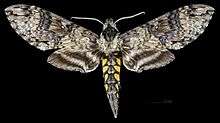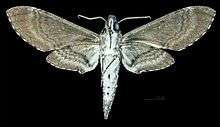Manduca clarki
Manduca clarki is a moth of the family Sphingidae first described by Walter Rothschild and Karl Jordan in 1916. It is known from Brazil, Colombia, Ecuador, Peru and Bolivia.[2]
| Manduca clarki | |
|---|---|
 | |
| Male, dorsal view | |
 | |
| Male, ventral view | |
| Scientific classification | |
| Kingdom: | Animalia |
| Phylum: | Arthropoda |
| Class: | Insecta |
| Order: | Lepidoptera |
| Family: | Sphingidae |
| Genus: | Manduca |
| Species: | M. clarki |
| Binomial name | |
| Manduca clarki | |
| Synonyms | |
| |
The length of the forewings is 45–50 mm. It is similar in appearance to several other members of the genus Manduca, but a number of differences distinguish it from Manduca scutata, Manduca pellenia and Manduca lucetius, to which it most closely compares, particularly in its smaller size, the grey pale parts of the upperside of the thorax and wings and the less elongate forewing shape. Although the forewing and hindwing pattern is almost identical to Manduca lucetius, there is a difference, the marginal grey band of the hindwing is less shaded with black.
There are at least two generations per year with adults on wing from November/December to January and again in July.
References
- "CATE Creating a Taxonomic eScience - Sphingidae". Cate-sphingidae.org. Retrieved 2011-11-01.
- "Silkmoths". Silkmoths.bizland.com. 2011-03-07. Archived from the original on 2012-10-11. Retrieved 2011-11-01.